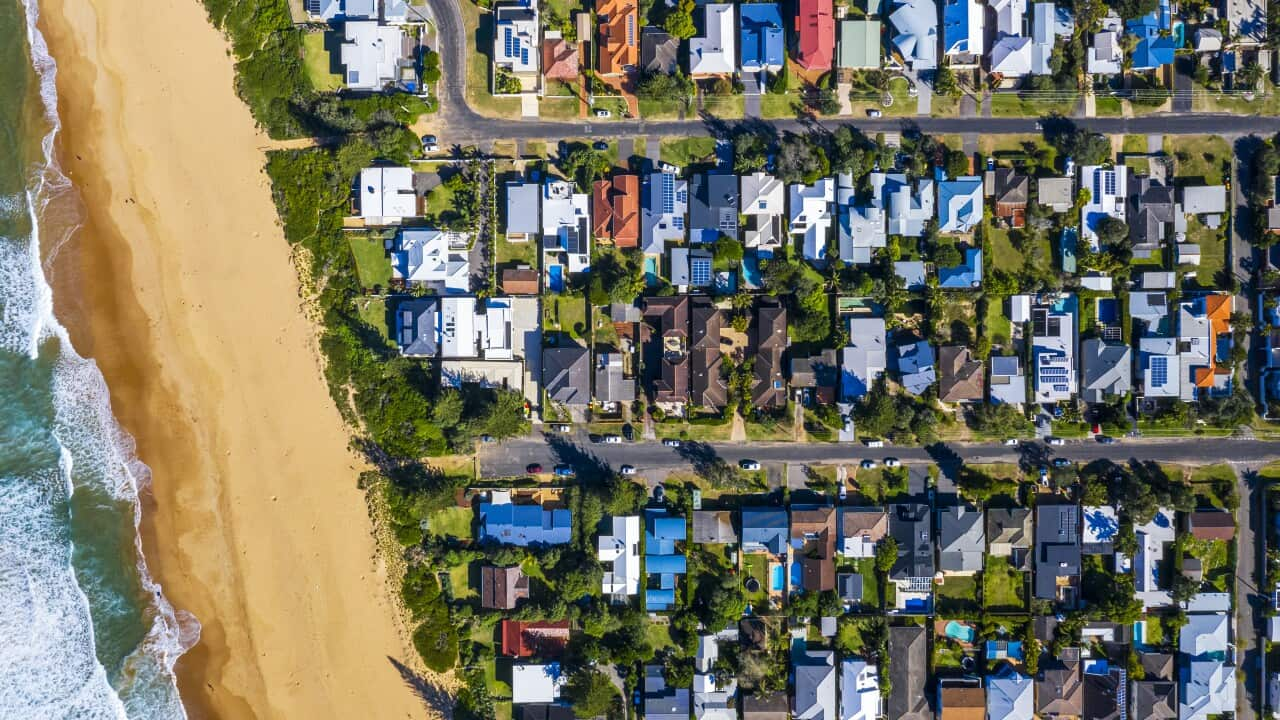Key Points
- Amid a rise in the cost of living and inflation, renters are encountering rental price increases.
- What are your rights as a renter if your landlord decides to raise your fees?
For mother-of-two Amanda Elsner, the issue of stable housing for her family is something that keeps her awake at night.
In five months, her rental agreement is due to be renewed and the prospect of a steep price rise is something that worries her.
"We are a low-income household. With the rising cost of living, there is very little extra funds to spare," she told SBS News from Port Adelaide.

Amanda Elsner, who lives with her two sons, is struggling to pay the rent amid the rising cost of living pressures. Source: Supplied / Amanda Elsner
For the past five years, Ms Elsner said she has paid the rent punctually, budgeting to ensure her two sons - aged 16 and nine - can eat.
"Sometimes, I have to miss out on the luxury items. For example, the boys might want a video game."
, released on 1 July, shows rental prices across the country increased 0.9 per cent in June, taking the annual growth rate to 9.5 per cent.
That is the highest annual growth rate since December 2007.
Regional rents grew more steeply than in the capital cities - 10.8 per cent compared to 8.8 per cent.
Increasing requests for legal advice on rent increases
Tenants Queensland said there has been an increasing volume of queries for legal advice on options to negotiate or challenge rent increases.
CEO Penny Carr said the pandemic protections of temporary moratoriums on evictions and rent increases have been lifted and tenants are left with limited bargaining power when it comes to negotiating with their landlord.
"[Renters] are always worried and some live in a perpetual state of fear that ... if they do anything that the other party, in particular, the agent doesn't like, they will be out at the end of the fixed term," Ms Carr said.
The Tenants' Union of NSW has fielded double the number of inquiries, from an average of 3 per cent of its caseload in late 2020-early 2021 to 6 per cent in three months to March this year.
CEO Leo Patterson Ross said that number continues to grow, driven mostly by tenants in regional parts of NSW.
"People are really facing a lot of increases, and that might be during their tenancies, or it might be because they've been evicted or forced to move, and they are now trying to find a new home and they're all much more expensive than their previous homes," Mr Ross said.
Growing number of Australians experiencing rental stress
found a third of those renting (32.2 per cent) were in rental stress - defined as allocating at least 30 per cent of gross household income on rent.
For low-income households in the private rental market, that figure increases to , according to the Productivity Commission.
Thirty-two per cent of the Australian population are renters, .
released last month, commissioned by the Housing All Australians business-led initiative, projected that more than two million low-income renter households would be in serious housing stress by 2051.
The economic cost to the community on health, education, crime costs and productivity was calculated to reach $25 billion per year by 2051.
How should I negotiate my a rental price increase?
Mr Ross said tenants should contact their local tenants' union or community legal centre to canvas the legal options for their specific circumstances.
He said with high demand for rental properties in many parts of Australia, the market and legislative settings provide greater bargaining and negotiating power for landlords and property managers.
Negotiation between the landlord and tenant is recommended as the first step as the landlord has the discretion to withdraw or reduce the amount of the rent increase. Developments should be followed up and documented in writing.
Mr Ross said tenants can choose to contest the rent increase by lodging an application with the relevant tribunal, commissioner or local court.
But the pathway does not guarantee the rent increase will be scrapped or reduced.
"There can be retaliation."

People across the country have experienced rental increases in line with increased cost of living. Source: AAP / James Ross
South Australian Greens MP Robert Simms said he plans to introduce a bill this month in the state's parliament to limit rent increases to the rate of inflation.
It would also restrict rent increases to one for each two-year period.
Anti-Poverty Network of South Australia campaigner Pas Forgioni said the bill is long overdue.
"It should be considered a basic right like access to energy."
How should I make my case if I dispute a rental increase at a civil administration tribunal?
At the relevant state tribunal, the onus will be on the tenant to prove the rent increase is excessive by presenting the relevant evidence.
Members of the tribunal can consider factors like the market rent in the neighbourhood for similar properties, the amenities provided in the property, and the landlord's expenses.
Mr Ross said when building a potential case to present at the tribunal, people are encouraged to seek legal advice, check compliance with the notice requirements, and research whether the rent increase is higher than the market rate.
"It requires a lot of work. A small number of cases in NSW come before the tribunal on rent increases. Of those that do - they are successful. But that doesn't exclude the landlord finding another way to force out a tenant."
Ms Carr said the being placed on the tenant makes it very challenging for them to achieve the result they are seeking.
"The outcome of a reduced rate increase or no rate increase is not guaranteed."
Tribunals have the power to set the rent, which could include approving the rent increase, for a period of time.
"If you lose the [tribunal] challenge, you're then stuck with that rent for the term of the agreement."
What are my rights if my landlord wants to increase my rent?
Victoria
If you rent with a fixed-term agreement, your landlord cannot increase your rent unless the contract states they can. If the agreement allows for an increase, your landlord must provide 60 days' notice in writing. They must also do this for tenants on month-by-month agreements.
The law in Victoria doesn't restrict the amount your landlord can increase your rent, but in most cases, they can only do so once every 12 months.
They must also tell you how the increase was calculated.
You can ask Consumer Affairs Victoria (CAV) to conduct a free rent assessment if you try to negotiate with your landlord about the increase and are unable to agree, but you must ask for one within 30 days of receiving the notice of their intention to increase the price.
CAV will inspect the property and provide an assessment to you and your landlord. If the assessment says the increase is too high but your landlord refuses to lower it, you can apply to have the matter heard at the Victorian Civil and Administrative Tribunal. But you must do so within 30 days of receiving the assessment.
NSW
If you are renting on a fixed-term agreement that's less than two years, your landlord can only increase your rent if your contract states they can.
If it does, it must specify the amount of the increase or the method of calculating it. NSW Fair Trading says a landlord cannot provide a vague statement of calculation, such as "in line with the market".
For those with an agreement that is two years or more, your landlord can only increase your rent once every 12 months and must provide you with at least 60 days' written notice.
If you are on a month-by-month lease, your landlord must provide you with the same notice and can only increase your rent once in any 12-month period.
You can try to negotiate with your landlord if you feel the proposed increase is unreasonable. If you are unable to agree on a figure, you can apply to have the matter heard at the NSW Civil and Administrative Tribunal.
Queensland
Rent increases need to comply with the , specific tenancy agreements, and notice requirements.
For fixed-term agreements, rent cannot be increased during the fixed term unless stated in the tenancy agreement, which also needs to specify how the new amount will be calculated.
It needs to be at least six months since the last increase, or since the tenancy began. Two months' written notice of the increase must be provided, with reference to the increased amount and the day it takes effect.
Similarly, for periodic agreements, the same two months notice in writing and a six-month gap between the last rent increase applies.
For new agreements, a rent increase can be negotiated with no requirement to serve notice. But it must still be at least six months since the last rent increase.
If the tenant feels the rent increase is excessive, they can choose to dispute the matter by applying for .
Participation in the process for both parties is voluntary.
If dispute resolution is unsuccessful and the matter meets the , such as eviction, an application can also be made to the Queensland Civil and Administrative Tribunal.
The application must be made within 30 days of receiving the notice of the rent increase.
South Australia
Rent increases need to comply with the , specific tenancy agreements, and notice requirements.
For tenants on a fixed-term agreement, a rent increase cannot take place unless there is a condition that allows for it in the agreement.
It will need to specify how the increase will be calculated, such as with reference to inflation.
Separate written notice of at least 60 days still needs to be provided. The increase cannot be imposed until 12 months after the last rent increase, or 12 months after the agreement started.
For periodic agreements, the same written notice requirement as outlined above also applies.
, where rent can be increased include when the tenant agrees to it - but the agreement should be clear and in writing.
Tenants can challenge the rent increase, proving it is excessive by .
Western Australia
Rent increases need to comply with the , specific tenancy agreements, and notice requirements.
Under a fixed-term residency, rent increases can only proceed if the agreement includes a provision allowing for it, including specifying how the increase is to be determined. The rent increase can only take place six months after the last increase, or six months after the tenancy agreement commences. Separate written notice of at least 60 days must be provided, and comply with .
Upon expiry of the fixed-term agreement, with the existing tenant moving to a new fixed-term deal or periodic agreement, a rent increase cannot take effect for the first 30 days of the new agreement.
For a periodic tenancy agreement, rent increases cannot occur until six months after the last increase. Separate written notice of at least 60 days must be provided as outlined above.
Tenants who believe the rent is too high can seek a reduction or argue against the increase by , with the judge considering issues such as if the rent is comparable with other properties in the area, or if the lessor is putting up the rent simply to force the tenant out.
Tasmania
Rent increases need to comply with the , specific tenancy agreement, and notice requirements.
Rent can only be increased for tenants who are living under a written lease that provides for rent increases, or for tenants living under a (usually a periodic agreement).
The rent increase can only proceed if the proper written notice rules are complied with, including at least 60 days' notice and specification of new rent amount and the start date.
LISTEN TO

Record rental squeeze increasing homelessness, discrimination
SBS News
14/04/202203:13
Rent can only be increased at the beginning of the lease or at the date of the lease renewal or extension. The increase can only occur 12 months after the last increase, or after the tenancy started.
For tenants who believe the rent increase is unreasonably high, they can seek to have it reviewed by .
Northern Territory
Rent increases need to comply with the , specific tenancy agreement, and notice requirements.
Rent can only be increased during a tenancy if a provision allows for it in the tenancy agreement, which must also include the method of calculation for the increase. Written notice of at least 30 days must be provided before the rent increase, which references the amount of increase, and the date it commences. The date of commencement of the increase must be at least six months after the last increase, or at least six months after the tenancy began.
If the tenancy agreement does not contain a rent increase provision, a rent increase can proceed after an agreement is on foot between the tenant and landlord.
Tenants can seek to review the rent increase if they believe it is excessive, by .
ACT
Rent increases need to comply with the on residential tenancies, specific tenancy agreements, and notice requirements.
For tenants on a fixed-term tenancy agreement, rent increases cannot occur during the term of the agreement unless there is a provision allowing it, stating the method of calculating the increase. A 12-month period is required between increases. Separate written notice of at least eight weeks is required conforming to the prescribed rules, including stating the amount of increase and the date it starts.
For tenants in a periodic tenancy, the rent can be increased once every 12 months. The same notice requirements apply.
A rent increase is presumed excessive - and therefore not allowed - if it exceeds the "prescribed amount" as set out in the Residential Tenancies Regulations 1998.
Referencing the CPI figure, the prescribed amount is in Canberra.
A landlord can seek a rent increase above the prescribed amount but will have the onus to seek approval for that size of increase through the ACT Civil and Administrative Tribunal (ACAT).
Tenants seeking to challenge a rent increase below the prescribed amount, at least a fortnight before the start date of the proposed increase.
What's being done to ease rental pressures?
The new Labor federal government has vowed to implement a $10 billion program to build 30,000 social and affordable homes over five years.
Advocacy group Better Renting has welcomed this, but said more social housing is needed to address the housing supply problem.
The group's founder, Joel Dignam, said the need for relief is urgent.
"We need action now."
The latest 2021 Census data points to across the country on Census night on 10 August 2021.
Ms Carr said more investigation is needed to determine if there is under-utilised housing stock that could be turned into social housing.
"I think we do need to look much more closely. We need to know who the landlords are in Queensland and in Australia, and how many properties they have, and keep a bit of a better check on it, but we don't have that detail at the moment," Ms Carr said.
Mr Ross said caps on rent increases have been introduced in many jurisdictions overseas, including New York, Ireland and Spain, adding that Australia is an outlier among OECD nations for not doing so.
"We need to move forward on this."














